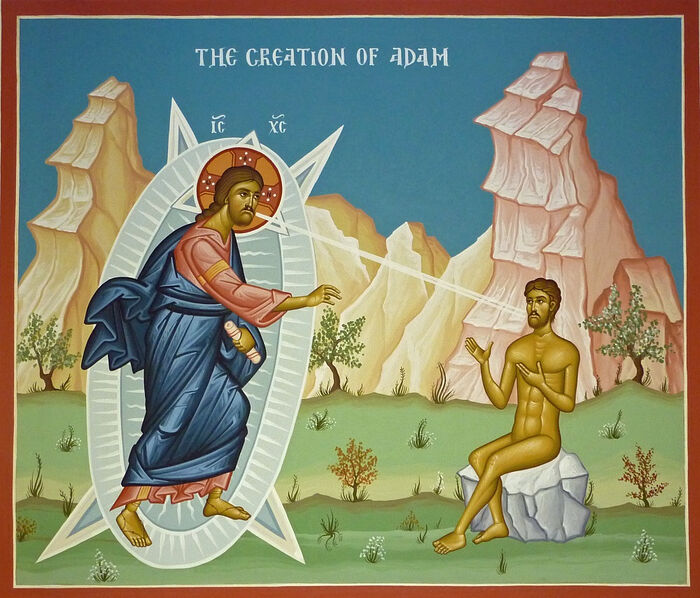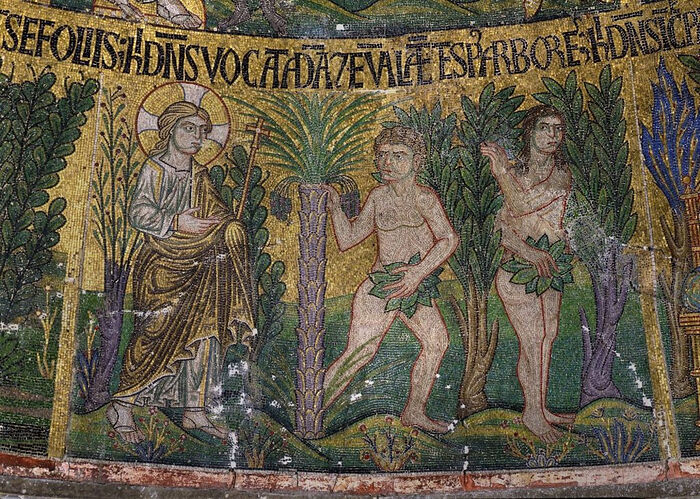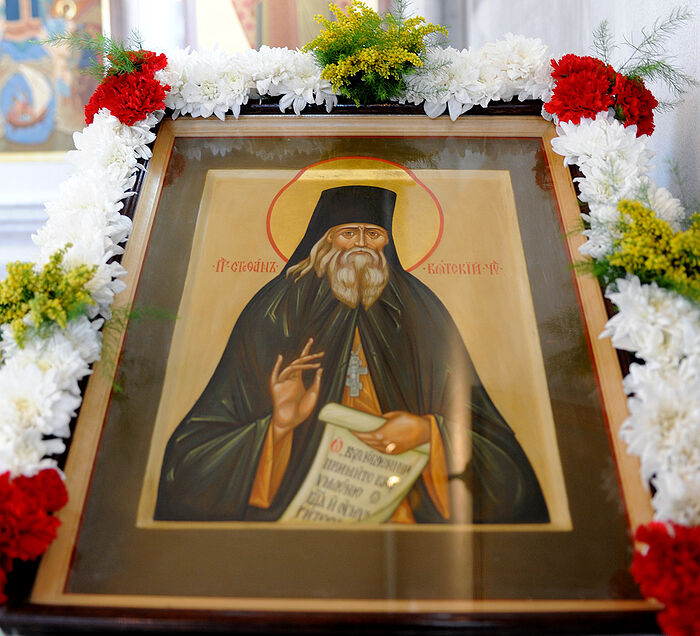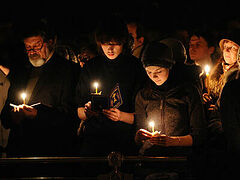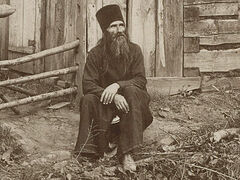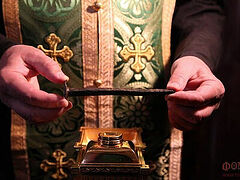In his works, St. Stephan often touches upon questions of Christian anthropology. Guided exclusively by Holy Scripture and the Patristic heritage, he quite deeply identifies the issue of creation and man’s calling. A special place in the study of this issue is held by his work, On God’s World.
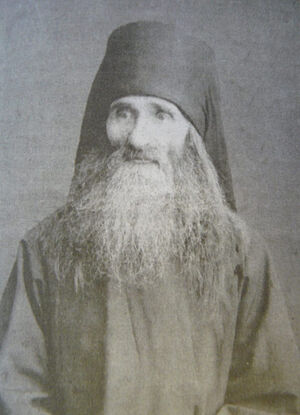 Hieroschemamonk Stephan (Kurteev) The Lord creates man in a particular way, preceding his creation with His counsel. God knew that man wouldn’t be able to endure on the level of “his godlike greatness,” that he would go against Him and, as a result, would become a participant in death and eternal torment. But from the beginning the Lord also knew by what sacrifice man would be reconciled with eternal truth. The creation of man was put into effect by the whole fullness of the Most Holy Trinity: Father, Son, and Holy Spirit.
Hieroschemamonk Stephan (Kurteev) The Lord creates man in a particular way, preceding his creation with His counsel. God knew that man wouldn’t be able to endure on the level of “his godlike greatness,” that he would go against Him and, as a result, would become a participant in death and eternal torment. But from the beginning the Lord also knew by what sacrifice man would be reconciled with eternal truth. The creation of man was put into effect by the whole fullness of the Most Holy Trinity: Father, Son, and Holy Spirit.
Fr. Stephan doesn’t make a particular or special distinction between the image and likeness of God in man. At the same time, he talks precisely about the manifestations of the image of God. From this list, St. Stephan highlights love, goodness, wisdom, reason, free will, and immortality. The godlike man is the one who loves and does only what is pleasing to God. Thus, the first-created man was like God in all his fullness.
It’s well known that the Holy Fathers speak of the freedom of man as an integral feature of the image of God in man. And, according to the teaching of the saint, man was given all possible powers from God so he could serve his Creator—including free will, which makes man like God, but “only when it fully agrees with the will of God and subjugates him to God.” But man also has the possibility of choosing another path—the path of resisting the will of God, of sin. In his arguments, St. Stephan directly relies on the Gospel teaching about the wide and narrow paths (Mt. 7:13-14), according to which a man has only two paths: to salvation or perdition.
Elsewhere, the saint expresses his thought about free will even more clearly: “Only man, endowed by God with both speech and reason, can, according to his will, both glorify and not glorify his Creator, and even pay no heed to how every creature glorifies Him.” Such a God-resisting will makes man akin to the devil. Freedom of will as such makes man responsible for his actions before God.
St. Stephan calls man the crown of all earthly creations. God creates man as a being meant to unite the Heavenly and earthly within himself—“a being who … had a fleshly nature and an immortal soul akin to the Heavenly powers, eternally blessed.” That’s why God put man in authority over everything living on earth.
The calling of man, according to the teaching of St. Stephan, is that he glorifies His Creator in soul and body. This is exactly what the first man was like: His mind was enlightened by the knowledge of God and his heart was filled with love for God; he had one desire—“to ceaselessly praise, thank, and magnify his Creator.” All of man’s abilities are given by God to serve Him and others. Fr. Stephan notes that even the ability to speak and hear was received by God solely in order to pay heed to the word of God, to preach it to others, to stimulate one another to love and good works and thereby serve for his own salvation and that of others. Following the path of obedience to the Creator, man can become a child of God in all its fullness and become like God by grace. Thus, the glorification of God with our lives and deeds is man’s main calling as a partaker of love of God. And the source of eternal and ineffable bliss for man is God Himself.
Speaking of the abode of the first man, on the one hand, Fr. Stephan gives a sensible image of Paradise—a place where man had no need of anything. On the other hand, he writes that the main blessing of the first people consisted in “their constantly abiding with God, Who made them His companions.” Thanks to this deep spiritual prayerful conversing with God, man in Paradise abode in truth.
Then God created Adam and his wife Eve. The first marriage was a sign of “His holy Church’s spiritual union with Christ, that is, those who believe in Him and love Him with all their hearts.”
The source of life and youth for the first people was the Tree of Life, and for his nurturing and free growth in love of God he had the Tree of the Knowledge of Good and Evil, of which the Lord commanded not to eat the fruit so as not to die. This commandment of God was supposed to show that the godlike perfection of man is possible only when man harmonizes his will with that of God. The consequence of breaking the commandment as a deviation from the will of God is the death of the soul and body. Opposition to the will of God is equally a rebellion of man against his godlike constitution.
The theme of the fall and its consequences also occupies a special place in the works of St. Stephan. According to his teaching, it was precisely “by the remembrance of death that sinless man in Paradise was kept from falling into sin.” As long as people remembered this, they were preserved from falling. But through the lack of proper love for God and trust in the devil, the first people violated the commandment of God. St. Stephan likens the disobedience of the first people to falling into a state of spiritual self-delusion. The direct consequence of the fall was the darkening of the image and likeness of God in man, his falling under the power of the devil and the curse placed on mankind and on the entire earth as the creation of God given to man. The innocent and blessed state of the forefathers couldn’t be inherited by their descendants, because “as fetid water flows from a stinking spring, so from the first people, infected with unbelief, come unbelieving descendants.” According to the word of St. Stephan, as a result of the fall, the whole of mankind was submitted to earthly vanity. Self-will and disobedience to God led to the first Adam not fulfilling his calling. As a result of the fall, man ceased to see God as the sole purpose of his life. Such a life, based on the satisfaction of worldly vanity and the flesh, makes man dead before the face of God.
Having fallen from God and being exiled to the earth outside of Paradise, man also found himself at the mercy of various external animosities: sickness, sadness, despondency, and labor have become man’s companions. The royal power of man over nature has also been shaken. All living things, having come out of the state of subordination to the first people, “armed themselves against them… Animals, even the reptiles, rebelled against the transgressors and violators of the Divine will… Everything is now at enmity with them.”
But, according to St. Stephan, the Lord didn’t abandon His creation. Despite his falling away from God, the damage to the image of God, and his falling under the power of the curse and death, he was again “destined to be born of the Spirit (cf. Jn. 3:8) and again sense the joy of eternal life within himself.” While still in Paradise, immediately after the fall, the Lord calls man to repentance and the healing of the sin he committed, but Adam proved to be indifferent to this call of God. In order to heal the distorted nature of man and to turn mankind to salvation, God Himself becomes man. Faith in the coming Savior has permeated the entire existence of mankind on earth from the moment of his expulsion from Paradise. Christ, having taken on human nature, united us with Himself and through this the whole of mankind was reconciled with God. Through the atoning sacrifice, Christ, having taken our sins upon Himself, gave man the possibility of transfiguring his soul. Without Christ, no man can be reborn to spiritual life and enlightenment from above. Only the Savior leads man “into the knowledge of the truth and instills in us the hope of eternal life.”
But in order for man to become a partaker of the fruits of the atoning sacrifice of our Lord Jesus Christ, he has to accept his Savior. St. Stephan teaches that through Christ a man who believes and is born in the water of Baptism is adopted to the Son of God. This right is given to man by faith in Christ, and by accepting Him, everyone can become a child of God (cf. Jn. 1:12). The Son of God, consubstantial with the Father, having become man, “so united us with Himself and reconciled us (cf. 2 Cor. 5:19) that He called us His brothers (Heb. 2:11), and gave us the Spirit of adoption, by Whom we cry: Abba, Father! (Rom. 8:15).
According to St. Stephan, with the coming of the Savior, the attitude towards physical death as suffering radically changes. For those who believe in Christ, His promises are also true. For such people, “death is only a transition from a temporal existence to the eternal, an exodus from this world and a migration to a better, immortal life.” At the same time, the fullness of beatitude will come after the Second Coming and the resurrection from the dead. Fr. Stephan doesn’t describe the details of the renewal of human nature through the resurrection. He only indicates that the righteous “will be cleansed from all defilement of the flesh, and their souls will turn white like snow.” The splendor of the glory that will be revealed in man remains hidden for now. The Savior, on par with the Heavenly powers will incessantly praise God, Who Himself is the Source of eternal blessedness.
St. Stephan also addresses the topic of eternal torment in some detail. As we have already written, through the Incarnation and Redemption, Christ opened the path to salvation and the transformation of fallen human nature, but the will to accept this depends on man himself. Man is required to accept the Sacrament of Baptism and moral and ascetic effort in submission to Christ. Man is required to be born of the spirit and traverse the path of following the commandments of God and fighting with sin. Otherwise, resisting His will “brings us to the same fate appointed for the enemy of God—the devil, and for all his accomplices,” St. Stephan concludes.
All of his works are either a direct or indirect call for Christians to turn to Christ in repentance to avoid the eternal destruction of the soul. This call is a golden thread running through all his works.

